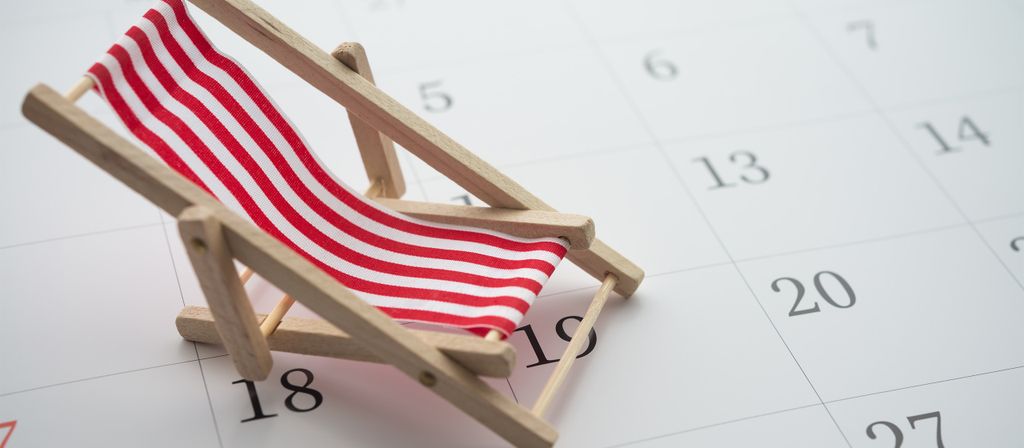Going on holiday? Leave work behind!

We all dream of switching off and forgetting about work and colleagues. It’s not always easy, but it’s vital to be able to fully log off. Fortunately, there are ways of achieving this. We’ll explain everything you need to know.
Taking time off requires careful planning.
The process of truly logging off begins before you even pack your suitcase. All too often, we underestimate the mental burden of what comes just before: the last-minute e-mails, the cases that need closing, the messages to leave for colleagues. Not to mention everything you need to do at home. But this is what will make or break your chance to truly relax. To switch off properly, you need to plan ahead: set a clear start date for your break (and stick to it), activate out-of-office messages on all communication channels, and most importantly, arrange cover. Arranging cover with a colleague who can handle emergencies means you won’t be contacted, and you won’t be tempted to check your e-mails either.
But preparation doesn’t stop at the office. You also need to set expectations with friends and family: agree on screen time boundaries, plan some joint activities (but leave room for spontaneity), and discuss everyone’s wishes beforehand to avoid the holiday becoming a non-stop negotiation.
A real digital break
Going on holiday, enjoying a change of scenery, escaping to new horizons… That feels like it should be enough to get away from everyday patterns. And yet this is often an illusion. Because leaving is not enough. You also need to properly log off, severing the (almost umbilical) connection to our screens, to our notifications, to this digital life that finds its way into everything. And therein lies perhaps the greatest challenge to our holidays: managing to really set ourselves free.
Our digital habits follow us like a shadow. They cross borders and time zones, reaching even the most isolated beaches. You’re sitting in the sun, looking out over a turquoise sea, and yet your first instinct is often to check your phone. A quick glance at an email, a reply to a WhatsApp message, a few minutes scrolling on Instagram… which soon turn into an hour. And many people around you are doing the same thing.
To be fully present, in the moment, we need to reinvent our relationship with technology and make a conscious choice to unplug from it, at least temporarily. This can involve some tough decisions: not taking your computer or tablet with you, deleting work applications, turning off notifications, putting your smartphone on airplane mode – or better still, leaving it in a drawer for a few hours a day.
But disconnecting in this way cannot be achieved merely through setting strict rules. You need to approach it gently, with mindfulness as well as purpose. You have to really want it and be convinced that it will be good for you too. You can also develop new habits: starting the day without a screen, taking your time over a silent breakfast, writing in a notebook, reading a few pages of a novel, devoting yourself to an activity that keeps your hands busy and frees your mind – drawing, gardening, cooking, DIY… All these simple things that digital technology has gradually nibbled away at, but which can once again offer a framework for being present in our own lives, because logging off is not about escaping, it’s about returning to life.
A new relationship to time
On holiday, time is your friend. Re-imagining your time, taking time for everything, is a way of disconnecting. Holidays are an invitation to slow down. But slowing down doesn’t always feel natural. Our daily lives are governed by schedules, deadlines and obligations. Creating a new relationship to time therefore requires a conscious effort: that of relearning to follow your needs, not a clock.
It can start simply: don’t set an alarm clock, let your body decide when to get up. Eat breakfast slowly, in silence, without podcasts or phones. Eat when you’re hungry, without over-planning. Take a nap if you feel like it. Read for its own sake, walk without going anywhere. It’s about getting out of sync with productive time, and entering a subjective and sensitive time that respects your inner rhythms.
These slow routines have a profound effect: they regenerate the nervous system, calm the mind and allow us to reconnect with ourselves. You’re not being lazy – it’s just another relationship to time.
What to do during the summer?
For some, holidays are an opportunity to get active, read, walk or visit people. All that’s enjoyable, but a little conventional at times. Summer can also be an opportunity to explore more original, introspective or simply unexpected activities. Here are a few suggestions:
Learn a craft: pottery, basketry, blacksmithing, sewing… Making things with your hands has a powerful meditative effect.
A silent retreat: a few days without words, surrounded by nature, to observe what’s going on inside you.
Local cuisine: learn how to make regional dishes with local people.
Temporary gardening: get involved in a communal vegetable garden at a guest house or farm.
Experimenting with “nothing”: set aside a whole day without planning anything, and simply follow your desires.
The aim is not to fill your time, but to enrich your experience. Summer is a time for new experiences, encounters with the unknown, and exploring just for the joy of it.
How can you make the benefits of your holiday last?
Often, holidays feel like they’ve barely begun before it’s time to go home. So it’s back to life as it was before the holidays, with all its ups and downs. Once you’re back home, the risk is that you’ll immediately fall back into the patterns. But there are a few simple things you can do to make the holiday spirit last a little longer:
Ease back in: avoid going back to work on a Monday, and plan a transition day to get back into the swing of things.
Avoid trying to squeeze everything into your first week back: you’re probably a little behind with your emails, and that’s no problem. You’ll get up to speed in due course.
Keep a new habit going: making time to write, an evening walk, a longer breakfast…
Make time to enjoy life: don’t wait for the next holiday to treat yourself.
Limit unnecessary meetings: review your priorities to keep some of the perspective you’ve gained.
Share your memories: talk about them, write them down, put up photos to keep your emotional memory alive. With colleagues or just for yourself.
At the end of the day, holidays are not just a break, they’re an opportunity, a chance to step back, slow down, and reconnect – with yourself, with others, with nature, with silence. Disconnecting is not an escape from the world, it’s a way of re-entering it in a different way. And if we manage to taste this inner freedom, however briefly, it leaves its mark. True luxury is not about how far you travel, but being fully present wherever you are. It’s that presence that you carry with you long after you’ve returned. So, yes, we need to forget everything… Or rather, remember what really matters.
Did you know ?
- News23 April, 20257 questions about Edenred Meal vouchers

- News7 June, 20246 efficient strategies for extra energy and wellbeing at work!
